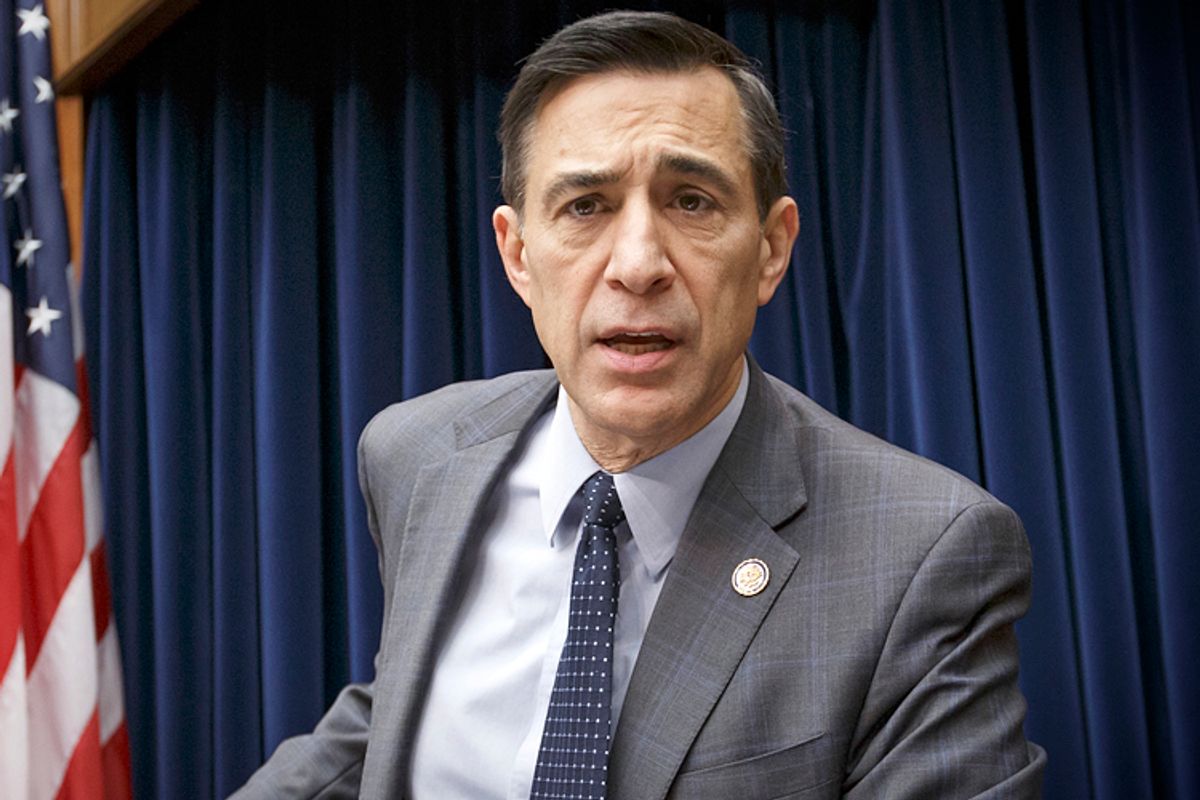After a brisk year-and-a-half of hearings and reviewing of hundreds of thousands of pages of documents, Rep. Darrell Issa's House Oversight and Government Reform Committee has come forth with a recommended overhaul of the agency. Oh, sure, "the Committee’s fact-finding is not yet complete," according to the proposal released yesterday -- Barack Obama is still president, and we're not at the midterms yet, so there's got to be more to come. But Issa has, at least, determined that his his creative mind has had enough time to ferment, and his team has arrived at 15 recommendations.
You will not be surprised to learn that Issa's recommendations do not include the obvious, common sense reform in the wake of the IRS nonprofit targeting scandal: more clearly defining what counts as "political speech" so the agency is better able to determine which groups will and won't receive 501(c)(4) "social welfare" tax exemptions. The scandal, such as it was, stemmed from a flood of nonprofit applications that the IRS was ill-equipped to handle. The exemption division thus resorted to using political search terms to determine which ones were truly seeking tax exemption to promote the "social welfare" and which were essentially political action committees looking to shield donors from public disclosure.
The IRS, over the past year, has tried to draft a new rule clarifying the wording of 501(c)(4) eligibility. That has not gone so well, since big 501(c)(4)s like Karl Rove's Crossroads GPS and the Koch brothers' Americans for Prosperity, who abuse the "social welfare" exemption to shield their donors from disclosure, might be out of business if the code was clarified to stop such abuse.
Issa's document, unsurprisingly, urges reform of "social welfare" nonprofits in the complete other direction: "Congress ought to consider legislation that removes the IRS as a regulator of the political speech by section 501(c)(4) groups by recognizing that political speech can be part of efforts to advance the social welfare." In other words, redefining "social welfare" to include any and all sorts of politicking. Watch, as he contextualizes this hilarious proposal in the sweeping language of the Founders:
Freedom of speech and freedom of assembly, including political speech and political association, are rights enshrined in the Constitution. As fundamental elements of the nation’s social contract, the right to speak and assemble freely are owned by all citizens and contribute to the betterment of shared society. In that respect, activities that promote free political speech and free political assembly benefit the general welfare. Social-welfare groups, organized under section 501(c)(4) of the Internal Revenue Code, are formed to “operate exclusively for the promotion of social welfare," and they should be allowed to engage in political speech within the confines of existing campaign-finance laws.
Under current law, the rule of thumb is that 501(c)(4)s may spend no more than 49 percent of their resources on "political" activity. Because if a 501(c)(4) is mostly a political group, then it should be registered as a political group -- a political action committee subject to donor disclosure. Issa is suggesting that political spending ought to count toward 501(c)(4)s' primary purpose as "social welfare" groups, raising that bar to, well, 100 percent -- "the IRS should presume to consider all types of political speech to be consistent with social-welfare conduct." Because of the Constitution, and stuff.
That would, in effect, be the end of donor disclosure to outside spending groups. Donors would flock -- well, continue flocking -- from PACs to these "dark money" nonprofits, to which they can make unlimited donations and keep their good names protected. Those "dark money" nonprofits would suddenly have free rein to do whatever they wanted, without even having to bother fooling the IRS anymore. Indeed, Issa appeals directly to the "need" for anonymous political donations in his argument:
The Supreme Court recognized in the 1950s the need for anonymous political speech because, as it explained, “compelled disclosure of affiliation with groups engaged in advocacy may constitute [an] effective . . . restraint on freedom of association,” particularly “where a group espouses dissident beliefs.”
And if the country needs anything now, it's allowing billionaires to continue purchasing the United States government in secret, without having to worry about getting mocked on the Internet.
Salon's Elias Isquith recently wrote about Issa and Republicans' ideological goals in pursuing the IRS investigation: to use the "scandal" as an argument about how the government is evil and to cut the agency's budget, and then, when those fewer resources lead to a mistake, to use that as an argument to prove that the government is naturally incompetent. That's all true. But, as this new report shows, one of the more ground-level goals is to effectively neuter what remains of our campaign finance regulations and protect big donors.

Shares